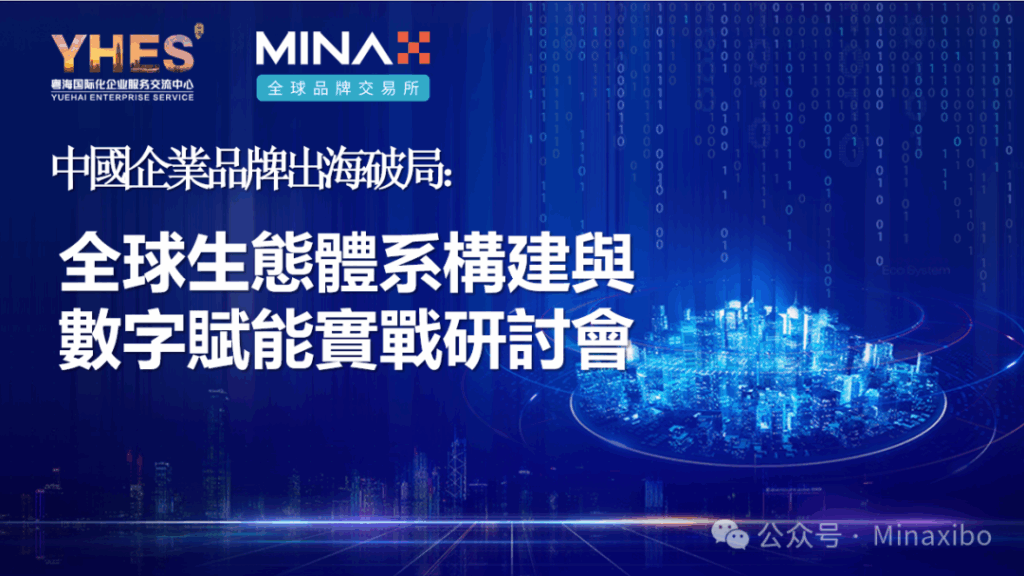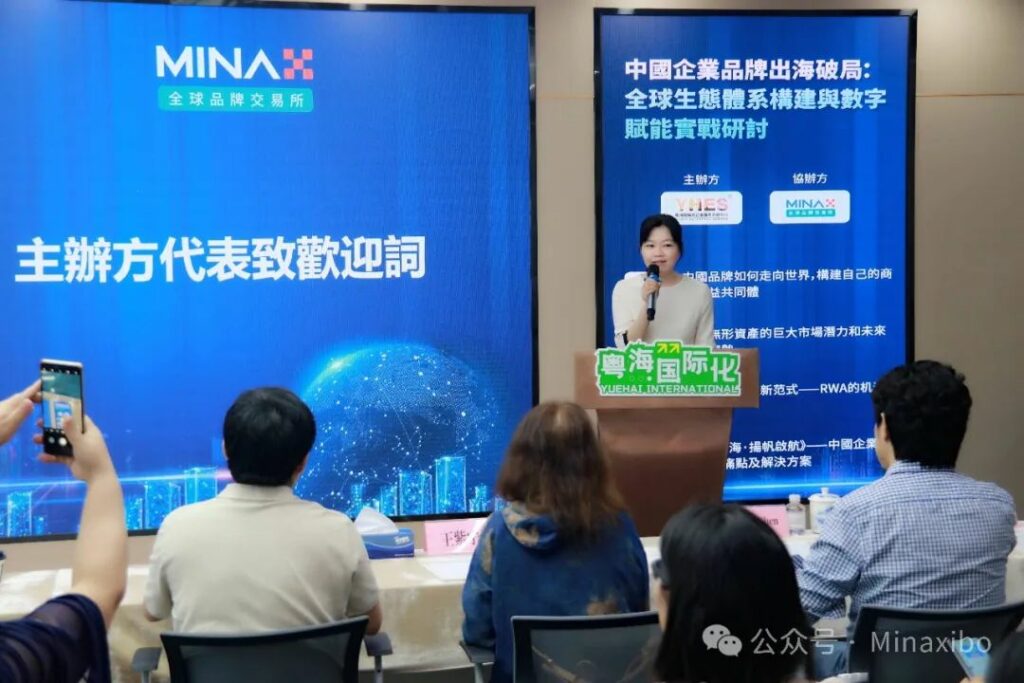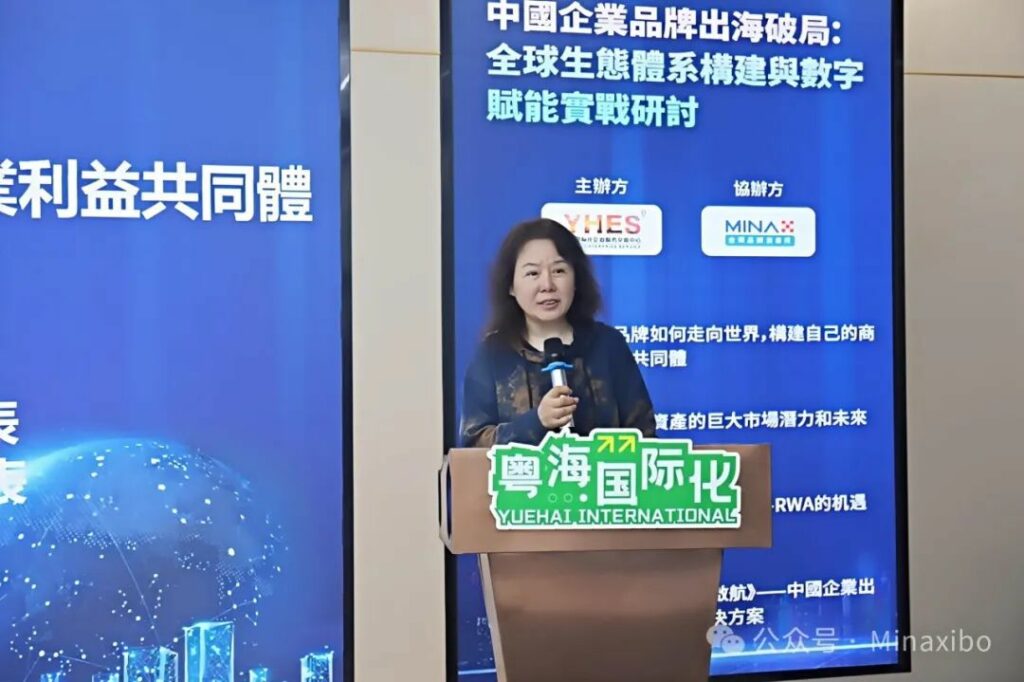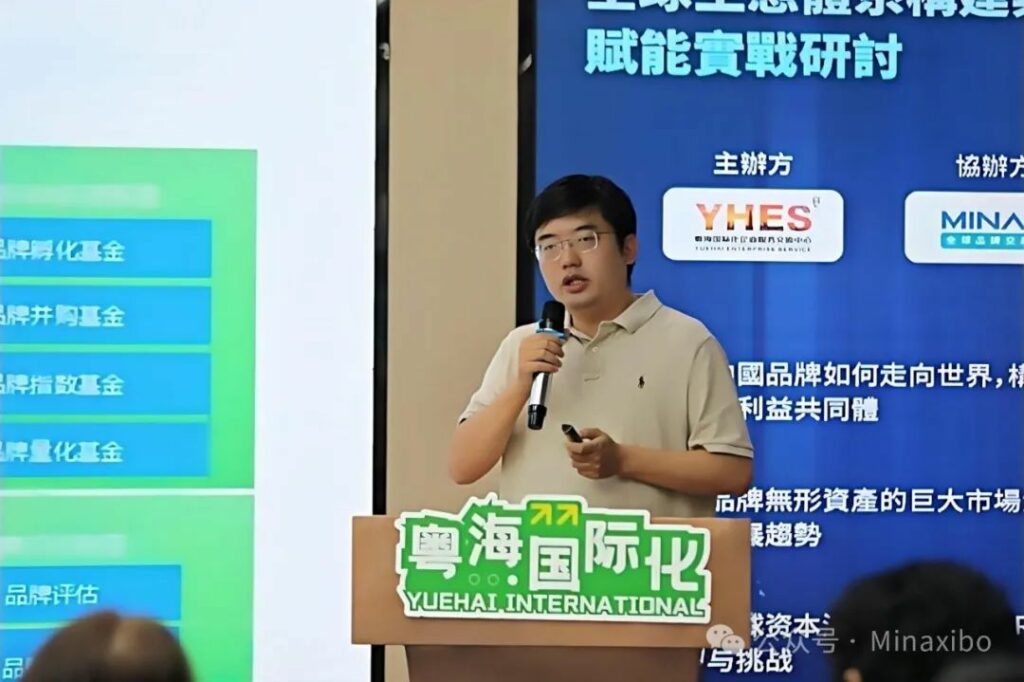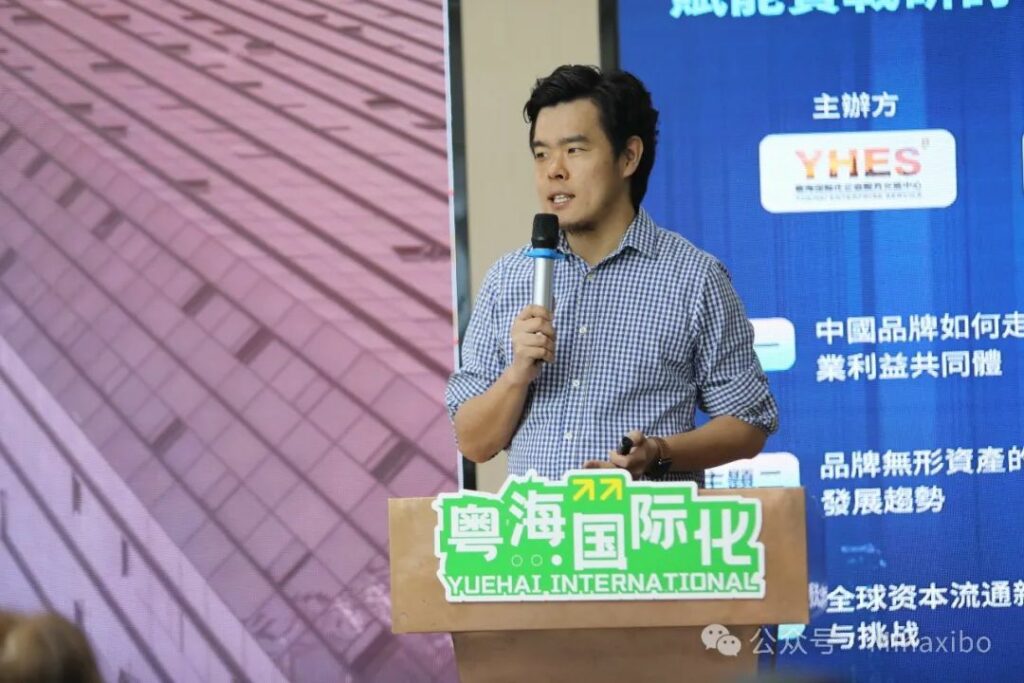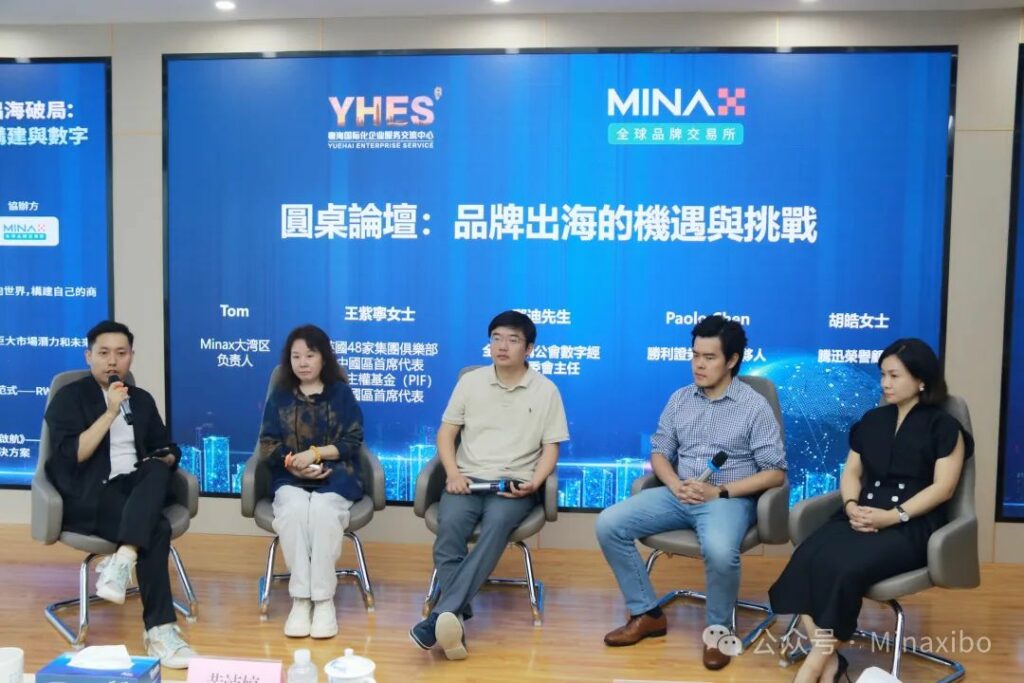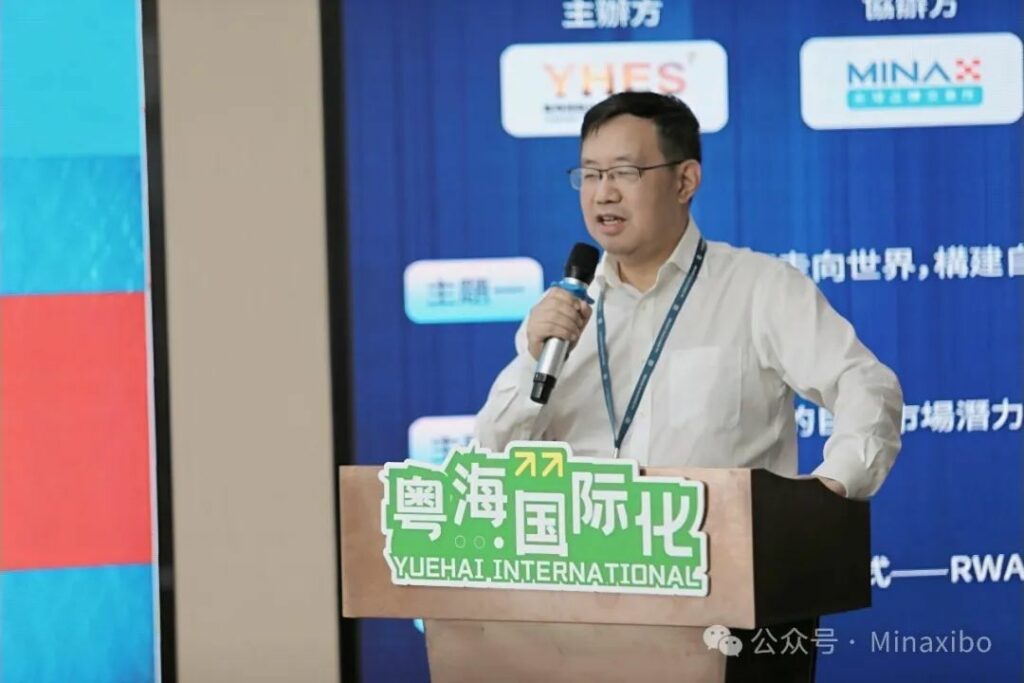On May 8, 2025, the “Global Ecosystem Construction and Digital Empowerment Practical Seminar” was grandly held at the Shenzhen Bay Yuehai International Enterprise Service Exchange Center. The event was hosted by the Shenzhen Yuehai International Enterprise Service Exchange Center and co-organized by MINAX Global Brand Exchange. Focusing on brand globalization strategies, digital transformation paths, and the construction of global brand ecosystems, the seminar brought together numerous international senior experts, entrepreneurs, and representatives of capital institutions to explore practical paths and systematic solutions for Chinese brands to go global.
In the opening speech, the head of the Yuehai Subdistrict Public Affairs Center stated that as one of Shenzhen’s first “international demonstration blocks” and “international industry innovation demonstration blocks,” Yuehai Subdistrict has always been committed to creating a first-class international business environment for enterprises. She pointed out that since its establishment, the Yuehai International Enterprise Service Exchange Center has served numerous local and outbound enterprises, promoting resource docking, policy implementation, and international exchanges, providing solid support for enterprises to “go global.” The event was an important practice in Yuehai’s continuous efforts to promote brand building and international development.
Authoritative Speeches: In-depth Interpretation of Brand Value and New Global Capital Trends
The main forum of the seminar focused on “The Global Application and Value of Brand Digitalization,” where guests from various fields shared insights:
Ms. Wang Zining, Chief Representative for China of The 48 Group Club and the Saudi Sovereign Fund (PIF), stated that for Chinese brands to truly “go global,” they must possess not only product and technological capabilities but also focus on building “business communities of shared interests” across regions and industries. She emphasized that the globalization path of Chinese brands should shift from single-point export to systematic participation in the global value chain. Through deep integration with international capital and industrial ecosystems, Chinese brands can enhance their voice and influence in global markets and build a sustainable international brand matrix.
Mr. Dundy, Director of the Digital Economy Committee of the All-China Federation of Mergers and Acquisitions Associations, highlighted that brands, as intangible corporate assets, hold enormous future valuation potential. He introduced the “MINAX Global Brand Exchange” project. The MINAX platform establishes an asset trading mechanism centered on brands, partnering with foundations and core enterprises to set brand value standards, promote on-chain management of brand assets, and enable compliant transactions. Enterprises can register trademarks, patents, data, and other intangible assets on-chain, and issue brand digital assets for financing, incentives, and value realization. The platform has obtained regulatory licenses in the UAE and supports the secure global circulation of brand assets. It also provides full-chain services such as brand valuation, global roadshows, and policy matching to help companies go public and accelerate brand internationalization.
Mr. Paolo Chen, Eco Partner at Victory Securities, focused on the application prospects of RWA in the digital finance era, emphasizing its core value in asset circulation and restructuring of trading models. He noted that the global capital system is accelerating its “disintermediation,” and on-chain finance and RWA will become the core infrastructure for the next generation of capital flows. By mapping traditional assets such as bonds, equity, and real estate on-chain, RWA offers high liquidity, transparency, and compliance, effectively connecting traditional finance with the Web3 ecosystem. He stressed that Hong Kong possesses unique institutional and resource advantages and should actively introduce high-quality asset pools from the mainland, using stablecoins and CBDCs to build a cross-border clearing system and create a new global asset finance hub.
Dr. Yu Zhou, former Huawei strategic expert, former Chief Planner of Huawei Global Training Center, and Chief Advisor of the Guangzhou Enterprise Globalization Service Center, provided a practical perspective by dissecting the “five major pain points” of SMEs going global and shared systematic solutions for brand globalization. Drawing on Huawei’s globalization experience, she deeply analyzed the five core pain points of Chinese brands going abroad and emphasized that only by firming globalization determination and transforming strategy into collective execution can enterprises transition from “product globalization” to “brand globalization.” She noted that the Middle East is becoming a new blue ocean driven by the digital economy, and by leveraging practical paths such as “riding the tide abroad,” Chinese enterprises can use policy platforms and industrial coordination to accelerate the construction of globally influential brand ecosystems.
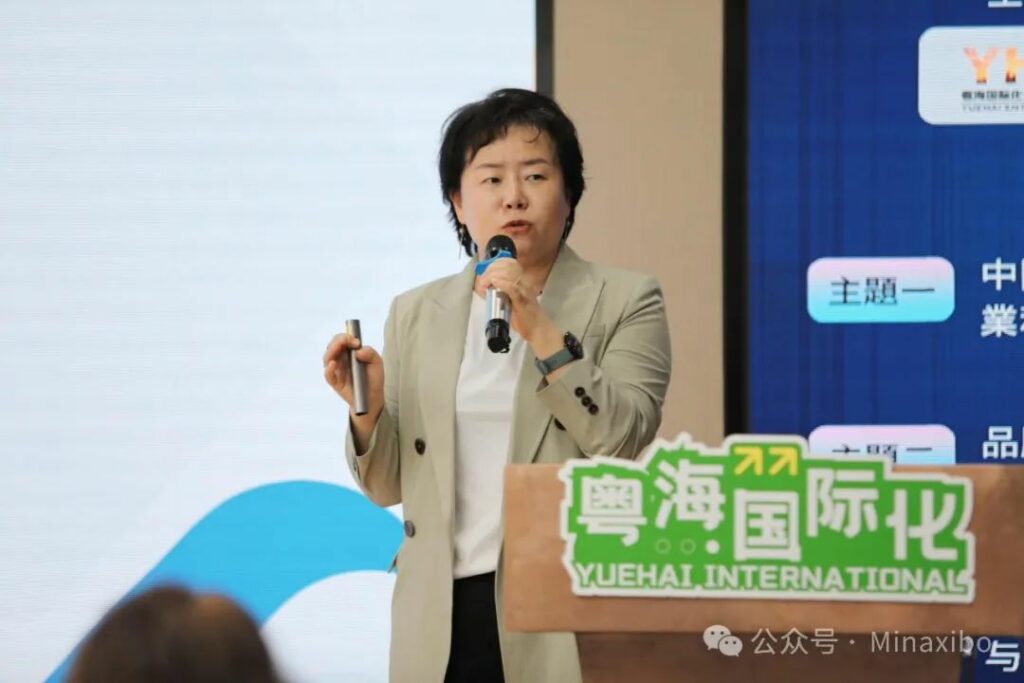
Former Huawei Strategy Expert, Former Chief Planner of Huawei Global Training Center
Chief Advisor of Guangzhou Enterprise Globalization Service Center – Dr. Yu Zhou
High-level Dialogue: Strategic Roadmap for Brand Globalization
In the roundtable session on “Opportunities and Challenges of Brand Globalization,” four guests—Ms. Wang Zining (The 48 Group Club & PIF China Representative), Mr. Dundy (All-China Federation of M&A Associations), Mr. Paolo Chen (Victory Securities), and Ms. Hu Hao (Honorary Advisor of Tencent)—held a lively discussion.
The guests pointed out that traditional IPO paths are high-barrier, complex, and costly for SMEs, seriously restricting brand globalization. In this regard, brand assetization becomes the key breakthrough. By transforming intangible assets into tradable capital, enterprises can achieve financing, incentives, and expansion. They also noted that Chinese companies face complex regulatory environments and dispersed resources when expanding overseas, but the establishment of brand trading mechanisms and global on-chain asset circulation platforms is providing more resilient and flexible capital docking channels, opening broader space for future brand globalization.
Enterprise Voices: Real Cases Show Consensus in Brand Transformation
At the event, representatives from various industries shared their brand globalization experiences:
Ms. Wan Yuhua, Founder of Bawang International Group, Chairwoman of Small World Group, and Founding Dean of Global Glamorous Women Academy, recalled her journey from founding the Bawang brand to its globalization and Bawang Group’s listing on the Hong Kong Main Board. She emphasized that brand strength is the core competitiveness of globalized enterprises—it represents not only product quality but also a company’s culture, values, and social responsibility. In the future, every enterprise must platform its brand ecosystem. She stated that artificial intelligence, blockchain, Web3.0, big data, RWA, and digital currencies are reshaping the world. As global industries rapidly restructure—especially with the Belt and Road Initiative and China–U.S. trade war—Chinese enterprises must globalize to grow stronger. She advocated for global resource and wisdom sharing, co-creating 100 vertically integrated global new productivity industry clusters, big data brand ecosystem platforms, and a digital new economy and wealth world. Finally, she cited her nearly ten-year journey to build the GGW (Global Glamorous Women) brand ecosystem platform. In partnership with MINAX Global Brand Exchange, GGW will list and issue tokens in Dubai. This ecosystem platform is expected to become the world’s largest economic empowerment platform for women, helping each woman achieve a healthy, happy, innovative, wise, and loving new life while contributing to building a better new world.
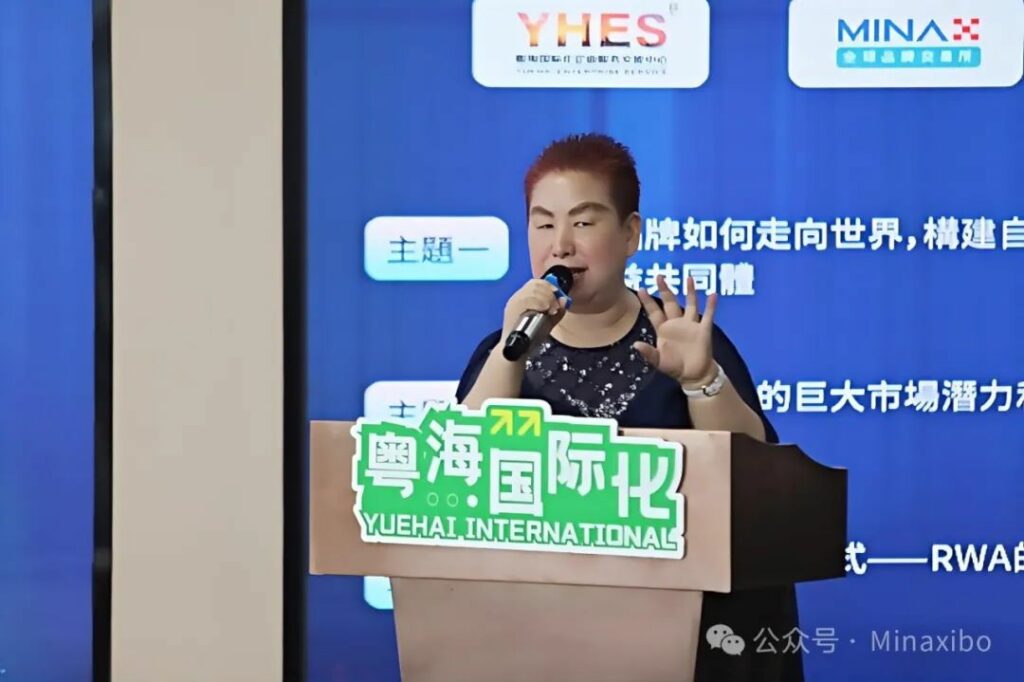
Founder of Bawang International Group
Founding Dean of Global Glamorous Women Academy – Ms. Wan Yuhua
Mr. Zheng Xiaojun, Secretary General of the World Free Trade Zones Union, stated that this is a strategic opportunity period for brand globalization. Chinese enterprises should leverage institutional innovation and digital economy advantages to build shared, win-win international platforms. He proposed that emerging offshore centers such as the Amber Economic Zone, with their advantages of “zero tax + compliance license + digital asset protection,” are providing brand-new outbound channels for enterprises. Future brand globalization should break barriers and develop collaboratively to form global ecosystems covering brand, capital, and resources.
Mr. Wu Shaowu, Chairman of Chaoxianggu Group, discussed how upgrading brand value in the health and wellness cultural industry can shift from product output to cultural export. Chaoxianggu holds 40% of the national market for a generation of Green Qinan agarwood and targets the $200 billion global market. The group is focusing on Middle Eastern cultural demand, consumption upgrades in Europe and the U.S., and Belt and Road opportunities, while addressing compliance certifications and supply chain challenges. Future international development will be achieved through brand upgrades, product innovation, and risk control.
Successful Conclusion: Opening a New Chapter for Chinese Brands Going Global
Currently, Chinese brands are embracing a new wave of globalization opportunities. Driven by digital empowerment and ecosystem co-construction, more and more brands with Chinese creativity are entering the global stage. This event was not only a feast of ideas but also provided a practical and actionable platform for Chinese brands to go global. As a co-organizer, MINAX will continue to deepen its work on the brand RWA system and digital financial infrastructure, promoting the construction of a more efficient, transparent, and sustainable global brand ecosystem.
【Risk Warning】This article’s content is for informational purposes only and does not constitute any investment advice. Brand asset trading and investment involve high risks and volatility. Users are advised to fully understand the associated risks and make cautious decisions before investing. MINAX is not responsible for any investment losses resulting from reliance on this content. Please invest rationally based on your risk tolerance.

